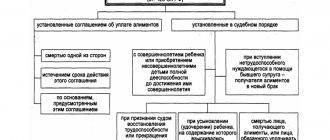Alimony is not a lifetime payment, so both alimony payers and alimony recipients should know the nuances that play a role in stopping payments. Please note that the recipient can terminate enforcement proceedings for alimony, however, the payer also has the same right.
When can enforcement proceedings be completed?
Enforcement proceedings for alimony are terminated:
- if the alimony payer or alimony recipient died, alimony obligations are not inherited;
- the child reaches eighteen years of age;
- if parental rights and responsibilities have been transferred to a new parent (that is, the child has been adopted);
- if the alimony payer hides, the bailiffs do not know where he is, and the payer is wanted - they suspend enforcement proceedings for a certain period until the payer is found.
You can terminate enforcement proceedings for alimony by submitting an application either to the magistrate’s court or to the bailiff.
Important: when enforcement proceedings are terminated, alimony ceases to be accrued both in a fixed amount and when a percentage is deducted from the alimony payer’s salary. In addition, there are other consequences that are associated with the termination of enforcement proceedings: the payer can take back his property, which was seized; the alimony debtor has his lost rights restored, for example those relating to traveling abroad.
What reasons serve as the basis for canceling the collection of alimony?
Alimony can be assigned in two ways: compulsorily with the help of judicial authorities and voluntarily by agreement of the parties. The Family Code provides grounds that may serve as reasons for canceling alimony payments. Such reasons include:
- the child reaches the age of majority if payments were made in his favor;
- emancipation of a child before the age of 18: independent provision of their needs, marriage before coming of age, the birth of their own children and complete independence from parents financially and otherwise;
- adoption of children by another person, such as their mother's new husband if she has remarried. Then all responsibilities for providing for the children pass to the new husband;
- cancellation of disability if there has been recovery and the opportunity for employment of the person to whom the payments were intended;
- entry of the spouse receiving alimony into a new marriage;
- The mother's period of care for her small child, who receives alimony from her ex-husband, has expired, because the child is three years old;
- due to the death of the payer or recipient. If a representative of the person to whom alimony is intended, for example, a mother receiving child support, dies, then in this case, payments for the child will be received by his new representative, for example, a grandmother. If, after the death of the mother, the child is taken in by the father who pays alimony, then he can petition for its cancellation;
- lack of biological relationship with the child who is assigned to pay child support.
Completion of enforcement proceedings on alimony by applying to the court authorities
In some cases, the bailiff has the right to stop enforcement proceedings only by a court ruling. To do this, it is necessary to submit an application to the judicial authority with a request to terminate the proceedings for the deduction of alimony. The court is obliged to consider the received application within ten days. All three parties are invited to the meeting: the alimony payer and the alimony recipient, as well as the bailiff. In this case, the failure of one of the parties to appear is not a reason to postpone the meeting.
After considering the application and the documents provided, the court makes an appropriate decision. If you disagree, you are allowed to appeal it to a higher authority within a fifteen-day period.
When writing an application to terminate enforcement proceedings, you do not need to pay an additional fee.
Application for termination of production. Sample
The enforcement case can be terminated at the request of the alimony recipient or alimony payer. As a rule, before contacting the bailiff, you need to obtain a court decision. But there are situations when the performer has the right to terminate production without such a decision.
Application to the bailiff
Proceedings are terminated based on the application in the following cases:
- the court issued a writ of execution, but subsequently terminated the proceedings;
- the judicial act that was the basis for issuing the writ of execution was cancelled;
- enforcement proceedings were initiated on the basis of a writ of execution that was declared invalid or cancelled;
- the court accepted the alimony recipient’s refusal to pay;
- the payer and the recipient entered into a settlement agreement.
In other cases, before contacting the executor with a statement, you need to obtain a court decision.
The application contains the following information:
- address, name of the territorial bailiff service;
- information about the applicant (full name, address, telephone number);
- when and on the basis of what document the enforcement case was opened;
- reasons for closing the proceedings, link to supporting documents;
- links to articles of the SK, Civil Procedure Code, Law No. 229-FZ;
- further state the request to terminate the proceedings;
- date, signature.
Documents confirming the stated facts are attached to the application.
The application review period is 5 days.
After the termination of the case, the alimony recipient has the right to receive writs of execution issued by the court. If necessary, the claimant has the right to re-submit the documents to the bailiff and demand recovery.
The writ of execution has a validity period. You can read more about this here.
Application to court
In some cases, before contacting the bailiff, you need to obtain a court decision to terminate the enforcement case. The application is submitted to the court at the location of the FSSI.
Please note: when filing a claim in court, the state fee is not withheld.
The statement notes information previously provided.
After 10 days from receiving the application, the judge makes a decision. The parties to the process (payer, alimony recipient and bailiff) are invited to the court hearing to give explanations. In this case, the failure of one of the parties to appear does not prevent the decision from being made.
Based on the results of consideration of the application and documents, the judge will issue a ruling to terminate the proceedings or refuse to terminate. The court decision can be appealed within 15 days.
The case is terminated, as a rule, at the request of the claimant. This happens when parents, for example, have agreed on a lump sum payment or the transfer of property to calculate child support. If the child is under 18 years of age, the application is an actual refusal of payments. The refusal should not be to the detriment of the interests of the child.
Reluctance to receive payments for children can be due to various reasons. In any case, you must submit an application for waiver of financial assistance and send it to the appropriate organization.
Dear readers! Our articles talk about typical ways to resolve legal issues, but each case is unique.
It's fast and free!
- Procedure and procedure for refusal
- Termination by a notary
- Settlement agreement
- Do not submit the writ of execution to the FSSP
- Revocation of the writ of execution
- Sample application
- Reasons for refusal
- Consequences
How to terminate enforcement proceedings by contacting a bailiff
Sometimes the bailiff may also terminate enforcement proceedings for alimony:
- if the court decided to terminate enforcement proceedings based on a previously issued writ of execution;
- cancellation of the act that served as the basis for drawing up the executive document;
- recognition of the writ of execution (sheet) as invalid;
- the alimony recipient refused alimony;
- the payer and the alimony recipient came to the conclusion of an amicable agreement on the calculation and payment of alimony.
Bailiffs closed enforcement proceedings to collect alimony from the debtor,
Hello, site visitor, in your case, you cannot prove in any way that the funds were not deposited by him, I think this is not necessary since it is your card, he can only transfer money to the card, this is reflected in the bank account statement
If the employer does not transfer alimony, then a fine may be imposed on the legal entity in this case (fines are provided for in paragraph 3 of Article 17.14 of the Code of Administrative Offenses of the Russian Federation) - this is the work of the bailiff Federal Law of June 27, 2011 N 161-FZ (as amended on July 18, 2017) “ About the national payment system"
“Code of the Russian Federation on Administrative Offenses” dated December 30, 2001 N 195-FZ (as amended on April 23, 2018) (as amended and supplemented, entered into force on May 14, 2018)
Article 17.14. Violation of legislation on enforcement proceedings
(introduced by Federal Law dated October 2, 2007 N 225-FZ)
1. Violation by the debtor of the legislation on enforcement proceedings, expressed in failure to comply with the legal requirements of the bailiff, provision of false information about his rights to property, failure to report dismissal from work, a new place of work, study, place of receipt of a pension, other income or place of residence , with the exception of the violation provided for in Article 17.17 of this Code, -
(as amended by Federal Law dated November 28, 2015 N 340-FZ)
(see text in the previous edition)
shall entail the imposition of an administrative fine on citizens in the amount of one thousand to two thousand five hundred rubles; for officials - from ten thousand to twenty thousand rubles; for legal entities - from thirty thousand to one hundred thousand rubles.
2. Failure by a bank or other credit organization to comply with the requirement contained in the executive document to collect funds from the debtor -
entails the imposition of an administrative fine on a bank or other credit organization in the amount of half of the amount of money to be recovered from the debtor, but not more than one million rubles.
2.1. Failure to comply with the requirements contained in the executive document to write off the debtor's personal account or securities account and credit the collector's personal account or securities account with equity securities if there are securities in the corresponding account of the debtor by the issuer, which independently carries out the activities of maintaining the register of owners of equity securities, a professional participant securities market, accounting for rights to issue-grade securities owned by the debtor -
shall entail the imposition of an administrative fine on legal entities in the amount of one-third of the value of the issue-grade securities subject to recovery, but not more than one-half of the value of such securities.
(Part two.1 introduced by Federal Law of July 19, 2009 N 205-FZ)
3. Violation by a person who is not a debtor of the legislation on enforcement proceedings, expressed in failure to comply with the legal requirements of the bailiff, refusal to receive confiscated property, provision of false information about the property status of the debtor, loss of the writ of execution, untimely dispatch of the writ of execution, failure to fulfill the requirements of the writ of execution document, including those received from the claimant -
(as amended by Federal Law dated 03/08/2015 N 57-FZ)
(see text in the previous edition)
shall entail the imposition of an administrative fine on citizens in the amount of two thousand to two thousand five hundred rubles; for officials - from fifteen thousand to twenty thousand rubles; for legal entities - from fifty thousand to one hundred thousand rubles.
How to terminate enforcement proceedings: application
An application to the court and to the bailiff conducting enforcement proceedings is written according to a similar template. It is necessary to indicate the personal information of the payer, as well as the contact information of the applicant. In case of going to court, the name of the authority is indicated, and in case of going to the bailiff - his surname and initials.
It is necessary to indicate on the basis of what documentation the enforcement process was started, as well as the date of opening of the enforcement proceedings. Here the applicant indicates the number of the court decision, as well as the date of publication of the document confirming the opening of enforcement proceedings.
The application must indicate what circumstances are the basis for termination of enforcement proceedings or have led to the impossibility of further fulfillment of alimony obligations. In this case, you should refer to documents confirming these facts.
Referring to the legislative norms set out in the Family Code, Civil Procedure Code and the Law on Enforcement Proceedings, it is necessary to make a request to terminate this enforcement proceeding.
After entering the final details of this document, the annexes are indicated - papers that are attached to such an application.
Requirements for the content of the application
An application to the joint venture service to cancel production must contain the information necessary to terminate production:
- legal address of the joint venture service that opened the enforcement case;
- Full name, telephone number and contact address of the applicant;
- information about the document on which alimony was collected;
- the reasons for termination of proceedings must be listed, documents presented as evidence;
- grounds of law: links to relevant articles of law to terminate collection;
- apply for termination of proceedings;
- At the end of the application, put your signature and the date of its preparation.
Application for termination of enforcement proceedings (sample)
Nuances of terminating enforcement proceedings for alimony
According to the general current rule, termination of such proceedings is possible when the requirements specified in the writ of execution are met, as well as when the writ of execution is returned back to the applicant.
In addition, if children have reached full legal capacity before the age of eighteen, enforcement proceedings can also be terminated. To do this, it is necessary to confirm that the child has started working, got married, or is able to provide for himself. If alimony was withheld for the maintenance of a disabled spouse who entered into a new marriage, it is also necessary to complete enforcement proceedings, because providing for the family is transferred to the new spouse.
It is worth emphasizing that when an agreement is concluded and enforcement proceedings are withdrawn, alimony obligations do not cease. The recipient has the opportunity to resume enforcement proceedings and forced payment of alimony at any time.
It is necessary to highlight cases when the proceedings are not terminated: the writ of execution is lost (the recipient of alimony needs to take a copy of it), the recipient entered into a new marriage, but the new spouse did not adopt children.
When terminating enforcement proceedings for alimony, they are guided by the following laws:
- Family Code – articles 109, 113, 120;
- Federal Law “On Enforcement Proceedings” – Article 12, 21, 30, 33, 39,40, 42, 44, 45, 47, 50, 64, 69, 121, 124;
- Code of Civil Procedure – Articles 441, 428, 430.
Grounds for termination of enforcement proceedings
Depending on the method of establishing alimony obligations, various types of grounds for termination of enforcement proceedings are provided.
Typically, the termination of obligations occurs due to the death of one or both parties, when there is actually no one to fulfill the obligations, or no one has the right to receive funds. It is worth noting that it is permissible to terminate enforcement proceedings on alimony obligations with arrears if the recipient of the funds so requests. As a rule, such demands are associated with blackmail of the recipient by the person obligated for alimony, for example, by issuing permission for the child to travel abroad.
When concluding an agreement to pay alimony
The grounds for termination of enforcement proceedings when concluding an agreement on the maintenance of a common minor child are established by law, unless such provisions are established by agreement of the parties.
In particular, enforcement proceedings may be terminated on the basis of:
- The child reaching the age of eighteen or another age established by the agreement as a reason for its termination.
- The child receives full rights and freedoms if the emancipation procedure has been carried out, however, the parties can agree in this case to maintain obligations to the minor.
- Transfer of any property in favor of a minor child to pay off alimony obligations in full for the entire period of their existence.
- Other circumstances that may be specified in the agreement on the payment of alimony by the parties.
It must be taken into account that enforcement proceedings against a person liable for alimony can be continued after the child turns 18, if for some reason there are arrears on alimony obligations.
When recovering through court
If there is a court decision, the grounds for termination of proceedings are reduced to a seriously limited minimum determined by law. The rules of agreements do not apply in such situations, and the bailiff is guided only by certain rules of law.
Termination of FSSP proceedings when establishing alimony obligations with the help of a court decision can be carried out due to the following reasons:
- Applications from the recipient of alimony to terminate enforcement proceedings, but this is taken into account only if the custodial parent has sufficient earnings. Otherwise, the bailiff can contact the guardianship and trusteeship authorities and check the legality of such actions of the parents.
- Death of one of the parties, since the law clearly defines that in the event of the death of one of the parties, the second party cannot count on receiving funds for living from other persons or maintaining payment obligations.
- The child reaches the age of eighteen. In this case, it is impossible to establish a specific age for termination of obligations, since the law determines that adulthood occurs at eighteen.
- The presence of irrefutable evidence of the absence of relationship between the recipient and the alimony payer, if the child was not adopted. In such circumstances, paternity is disputed and, based on the court's decision in this case, a decision is made to terminate proceedings against a specific person.
From a legislative point of view, termination of enforcement proceedings is possible only if there are serious and objective reasons, however, all regulations have their own reservations and additions.
In matters of enforcement proceedings on alimony, all proceedings and collection of funds can be terminated at the request of the recipient, and the alimony payer is completely deprived of such rights.








